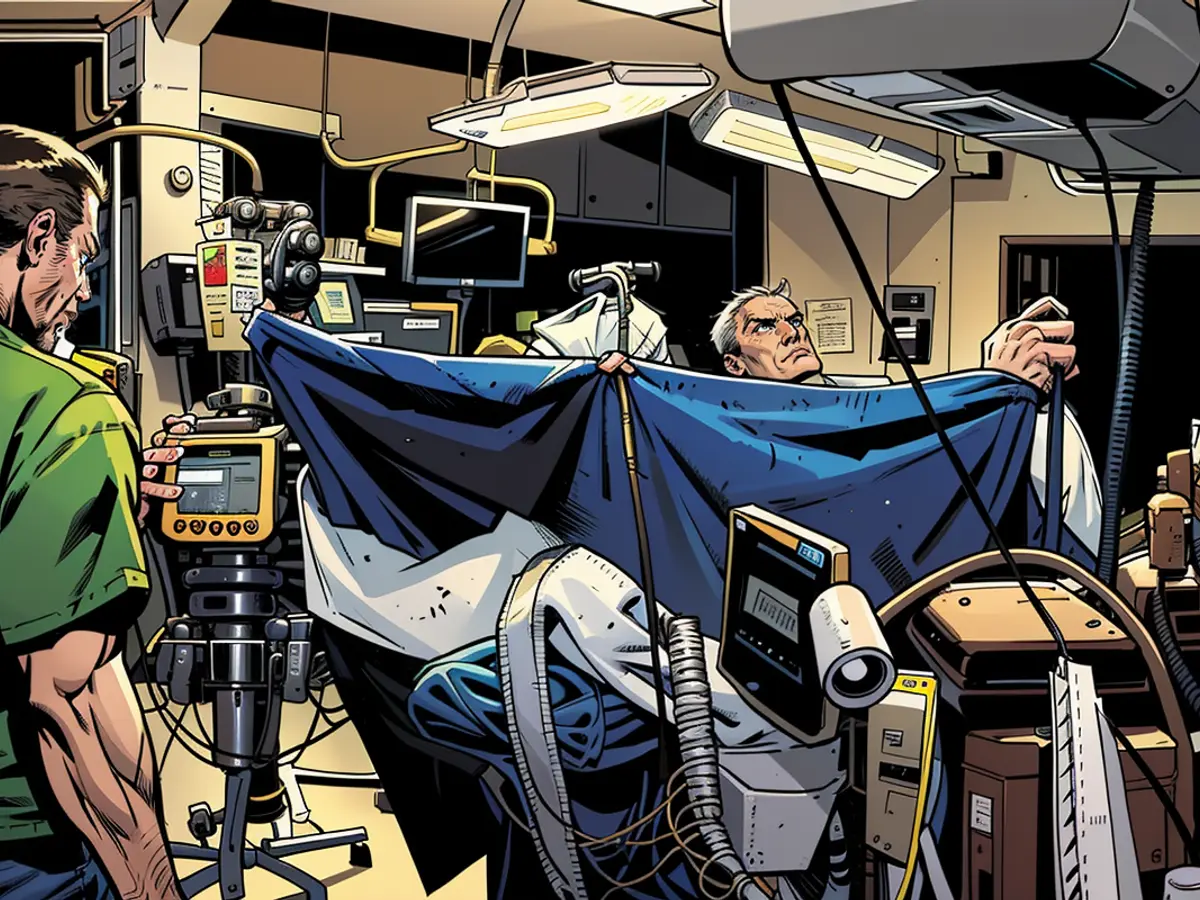Around seventy-five individuals are predicted to lose their lives in 2023 due to healthcare missteps.
Mistakes in medical treatments often lead to severe consequences, claiming 75 lives last year. Specialists are concerned that the actual number might be significantly higher and are advocating for compulsory reporting.
A mishap led to a 39-year-old woman undergoing sterilization instead of a planned cyst removal surgery. Mix-ups, administering incorrect medications, or leaving surgical tools inside the body post-operation are examples of incidents that should never happen, according to medical evaluators.
Approximately 150 such severe incidents were documented last year. The Medical Service revealed these numbers while presenting their 2023 annual statistics in Berlin. They function as assessors for statutory health and long-term care insurers. The deaths due to medical errors were 75 last year, whereas experts reported 84 such fatalities the previous year.
"Mandatory reporting is necessary to prevent such incidents," emphasizes Stefan Gronemeyer, CEO of the Medical Service of the German Federal Association. Regrettably, hospitals do not currently require such reporting, which means the statistics only include cases initiated by the patients themselves.
Every fifth instance revealed damage
The protocol currently is as follows: If a patient suspects an error during their treatment, they can approach their statutory health insurance company. The company can then employ the Medical Service to investigate the case. These cases are only counted in the statistics after investigation. This procedure was utilized 11,500 times in 2023, a decrease of around 600 instances compared to the previous year.
In the majority of instances (71.1%), the experts found no evidence of medical negligence. However, in approximately 20% of the cases (2,679 treatments), the patients experienced harm due to medical errors. This implies that the number of cases remains relatively consistent - a mere 17 additional cases were reported in the previous year. In all other instances, either no harm was detected, or a clear link between harm and negligence couldn't be established.
The proportion of proven errors is minuscule, accounting for less than 1% of all treatments in Germany. Considering the high number of annual treatment cases in practices, around 500 million, these errors can have severe consequences for patients.
How severe are the damages?
In most instances (65.5%), the harm to patients was temporary, but it is permanent for nearly a third (29.7%) of those affected. Last year, 180 of these permanent damages were classified as severe, leaving patients in need of constant care, blind, or paralyzed.
Experts believe that the actual number of treatment errors is probably much higher. They suspect that one percent of all hospital treatments result in avoidable harm. "Experts estimate that there are about 17,000 avoidable error-related deaths in our hospitals each year," explained CEO Gronemeyer, citing a study commissioned by the Action Alliance for Patient Safety.
To learn from these errors and prevent future occurrences, the Medical Service proposes a mandatory, penalty-free, and pseudonymized reporting system for such cases. They also advocate for a hardship fund.
"If such errors occur, potential issues in the supply process need to be systematically addressed," demanded Gronemeyer. He criticized that the hospital reform planned by the federal government does not include procedures for avoiding errors, which are already standard practice abroad.
The German Foundation for Patient Protection also severely criticized the handling of errors in the medical field. "Patients here are often left neglected. Because there is no error culture in practices and nursing homes," said the foundation's board, Eugen Brysch.
Upon request, the Federal Ministry of Health (BMG) stated that clinics and practices are already legally obligated to implement error reporting systems. "Both in the contract medical sector and in hospitals, evaluations indicate a high implementation rate for error management and error reporting systems," the ministry said.
To compensate those affected, a hardship fund as promised in the coalition agreement is necessary. "It cannot be acceptable that the injured have to wait for years to receive their rights," criticized Brysch and demanded a law from the health minister. The BMG stated that they are examining whether to commission a concept for the design of a hardship fund.
The German Federal Association's Medical Service, led by CEO Stefan Gronemeyer, strongly advocates for mandatory reporting of medical errors to prevent incidents like the one that led to a woman's sterilization. Despite hospitals not currently requiring such reporting, the Medical Service believes that mandatory, penalty-free, and pseudonymized reporting could provide valuable insights for error prevention.
In line with this sentiment, CEO Gronemeyer believes that about 17,000 avoidable error-related deaths occur annually in hospitals, citing a study commissioned by the Action Alliance for Patient Safety. This underscores the need for a more robust error reporting system and a hardship fund to support those affected by medical mistakes.








